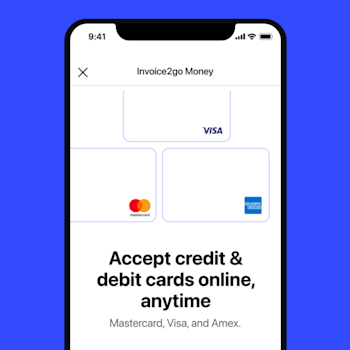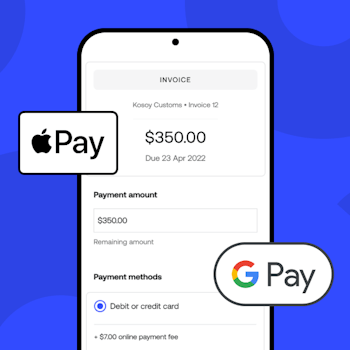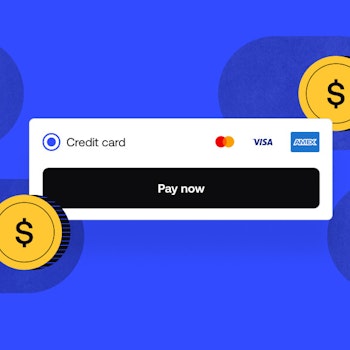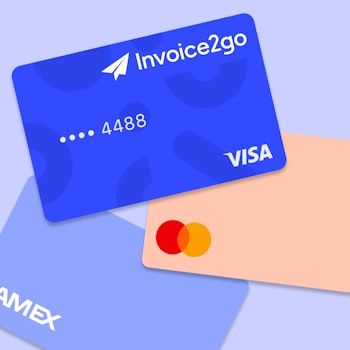
General contractors: here's how to win more projects and grow your business
Let’s learn how to win more contracting projects. We recently teamed up with Mike Claudio of WinRate Consulting in our global Invoice2go, a Bill.com company, Facebook community for contractors, landscapers, and construction professionals, The Self-Made Toolkit.
Mike Claudio coaches coach on sales, business development, and leadership. He draws on his experience working in corporate America and for both remodeling and roofing companies. As if that wasn’t enough – he now owns a grading and demolition company.
Over the years, Mike discovered he had a knack for helping construction businesses grow. He’s now helped over 50 construction companies grow and meet their goals through 1:1 coaching.
This video is packed with hard-hitting advice valuable to any contractor. Check it out to learn how to expand your business quickly by establishing a follow-up process and building a system to get more referrals.
These tips will help regardless of the type of work you do – and they will work even during a recession. Read on for a summary of Mike’s advice:
What are the main mistakes contractors make that cost them new jobs and business?
The biggest issue to win more contracting projects is accountability for implementation. Contractors often say, “I’m going to get on social media” or “I’m going to get a website.” Then all the distractions of life get in the way.
Is posting on social media directly mission-critical to helping your clients and putting out fires? No. However, you need to grow awareness about your company, establish credibility, and move towards your long term goals. Too many contractors get stuck thinking in the short term.
Most contractors think, “How do I solve the problems of this week?” or “How do I get my guys to work next week?” Few think about the longer-term.
They also talk themselves out of great ideas. Many construction professionals have great ideas that never come to fruition – they stay as concepts stay on the whiteboard.
80% of Mike coaches is what contractors already know on some level. They just need accountability and some tips on how to apply general advice to their specific business.
Remember: All businesses are problem solvers. Whether it’s with mulch, sod, or framing, your just solving your customers’ problems. There’s nothing different about the talk track or the process.
Instead of talking about an idea for months or years, put it to action. Get a coach or someone to keep you accountable.
To win more contracting projects, how important are follow-ups?
Many people worry they’ll bug their clients. They don’t know when to follow up or think the client will just call them when they’re ready. The client won’t.
You need to learn how to follow up with a client on their terms. In the world of sales, you control the process, but the client maintains the timeline. Clients do their research and take their time to decide. You can’t push them, but you can make it easy for them once they’re ready.
Never end a conversation without the next defined step and deadline. For example, if you say something like, “I’m going to send you the proposal by Tuesday. Let me know if you have any questions.” There is no defined next step
Instead, say, “I’m going to send you the proposal on Tuesday. How long do you want to think it over? Oh, a couple of days? OK. Is it cool to check in with you on Friday at 11 am if I don’t hear from you before then? Awesome! I’ll put it on the calendar.”
Now you know you’re not bugging them because they’re expecting your call. You know they want to hear from you then because they told you.
You also to differentiate yourself as a contractor because so many don’t follow through. That’s a big complaint in our industry.
Because many homeowners believe that contractors are often late or not 100% reliable, if you call when you say you will and follow-through on the timeline you communicate, you’ll build massive trust.
In other words: if you can’t call when you say you will, how will they expect you to finish a project by the proposed deadline?
Never leave it to chance with a client. Get them to buy in, and always schedule clearly defined next steps. This habit will be massive for both your reputation and sales.
Is it better to communicate with clients over the phone or by email?
Ask clients how they like to communicate. During your sales process, ask them directly. As often as possible, schedule a phone call because it won’t end up in the junk folder. You might get lost in the clutter.
A phone call is more personal and speeds up the process. It might take 10 emails to do what you can do in a 3-minute call. It’s best to lean on the phone unless the client says explicitly otherwise.
Even better, schedule a Zoom call. Because then you can see them. You’ll be able to build a better level of personal relationship and credibility. You can say something like, “Let’s do a 5-minute Zoom call.” Then you can read their body language and have a better idea of what to say next.
Here’s the communication hierarchy from best to worst:
- Zoom
- Phone call
- Text message
- Email and social media direct messages
However, don’t be shy to reach out to prospects or referrals via social and email. You have nothing to lose.
Also, all of these are COVID safe. Clients are now more open to doing video calls. Check out Mike’s video on how to run a virtual consultation. You’ll learn how to set a talk track and plan for the meeting. You’ll also know what you should have clients do ahead of the meeting.
Why do a lot of contractors not follow up with clients?
Fear – they talk themselves out of it. They look for reasons not to. Call reluctance in sales is a huge problem. Whether you’re cold calling or prospecting, humans don’t like to feel pain and fear rejection. So often, contractors don’t call because they don’t want to be let down.
What people don’t realize is that calling separates you from the competition. Anxiety gets the best of them even though they don’t want to admit it.
You have to intentionally prioritize and schedule a time to call and follow up. You might want to use a CRM tracking system or do something like follow-up Friday. Since he doesn’t like working in the field on Friday afternoons, for the last two years, he’s made that his day to follow up with customers.
In the past five years, Mike has earned $10 million in revenue. He found that 40% of sales we directly related to follow-up activity. That’s $4 million.
There are 100 different reasons why a client hasn’t gotten back to you – and that’s not really their job. Your clients have jobs, families, feelings – 100 other things are going on in their lives. As a contractor, that’s your job.
Think about it this way: If you’ve spent the money on the marketing, hours talking to them, and writing a proposal, then you deserve to get a response. Whether the answer is yes, no, or not sure, don’t let a customer ghost you.
Mike follows up for months because he has nothing to lose. Making a phone call, shooting a message, or DM doesn’t cost anything. If they agree, I just won more business. If you don’t follow up, there’s no chance to close.
What if after 2 months someone just isn’t calling you back?
Follow up every week for a month. Then, every other week for 2 months. Finally, once a month for 3 months. That’s somewhere around 10-12 touches. It takes 7-12 contacts to close a deal. If they still don’t respond after that, let them go.
Are systems key to success as a contractor?
Systems create consistency, and that leads to success. Mike has a routine that he follows religiously. He wakes up every day at the same time and follows the same pattern.
Doing the same thing effectively over a long time, is the only way to win. If you put the win in someone else’s hands, you lose control. You can control how many calls you make in a day or if you educate yourself on business.
If a certain amount of revenue was your defining number this year – most people went through a dip because of the pandemic. You had no control over that.
This year Mike went through 2-3 months with almost no clients. Still, his process didn’t change. His content didn’t change, and his persona stayed the same.
Remember: results are great, but the only thing you can control is your process. Consistency is the root of all of Mike’s success.
What’s your advice to someone who’s had a tip and is feeling low?
Get back to the basics. What made you successful in the beginning? You likely told your family and your friends about your business. If you’re struggling, pick up the phone and call 20 people right now who might need your services. It’s that simple.
In Mike’s grading company, he does follow-ups twice a week. I put the word out there and put the content out there.
If you’re not successful, then it’s one of two things. Either there are not enough people who are aware of you. Or you’re not good enough at what you do.
If you’re not very good, then you need to change the services you offer. However, chances are that isn’t the case. You just need to get in front of more people, make more calls, and shoot more DMs.
If you make 10 phone calls every day for the rest of the year, you’ll boost your sales.
How do you set yourself up so you can get referrals for new business?
50-60 of prospecting is with referral partners. Ideal referral partners are in a trusted advisory role of your client base. Think about financial advisors, real estate agents, more prominent contractors, and people like that.
They also need to directly benefit from referring you. For example, a real estate agent can’t go to the closing table if you don’t do your work. That makes it really easy for them to refer you.
Mike chases referral partners aggressively and is always on the lookout for people who will win when he does his job well. That way, you don’t have to pay referral fees. All you need is 5-10 referral partners, and you’ll double your business. Treat them and appreciate them, but that’s all you need to do. Consider a year-end gift, but you don’t need to do referral bonuses.
Imagine you walk into the networking room. Everyone wants to talk to the realtor. Why not speak to the financial advisor? They may have connections with wealthy homeowners looking to spend their money. Keep your eyes open.
If you had only 1,000 to invest in your business as a contractor, what would you do?
Mike would buy lunch for 20 people. He’d find 20 people who would be referral partners and buy them each a $50 lunch. That would add up to $1,000 and be more with it than any other advertising.
We hope you enjoyed this presentation on how to win more contracts projects! To get more of Mike’s resources, you can visit his website, Instagram, podcast, or YouTube Channel. Also, join the Go Getters Community for more valuable information for contractors, landscapers, and construction professionals.
Related Articles

How to accept credit card payments on Invoice2go in 3 simple steps

Accept payments online via Apple Pay and Google Pay

Must-not-miss write-offs as you wrap up 2022 year-end finances

5 ways accepting credit and debit card payments helps your business stay resilient

4 easy ways to increase cash flow today

What is Small Business Saturday and why is it important?
The features and surprising benefits of a well-designed packing slip
